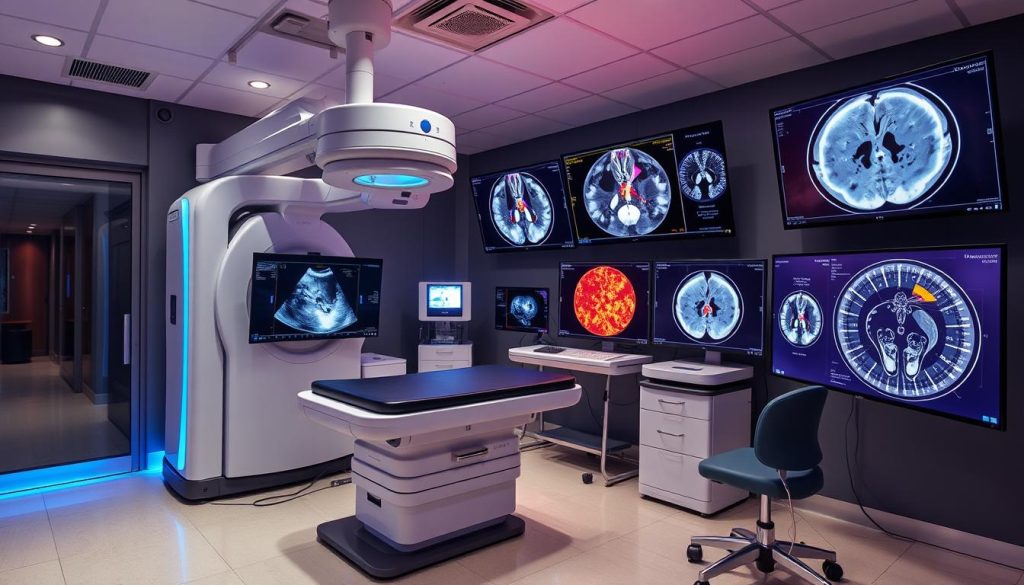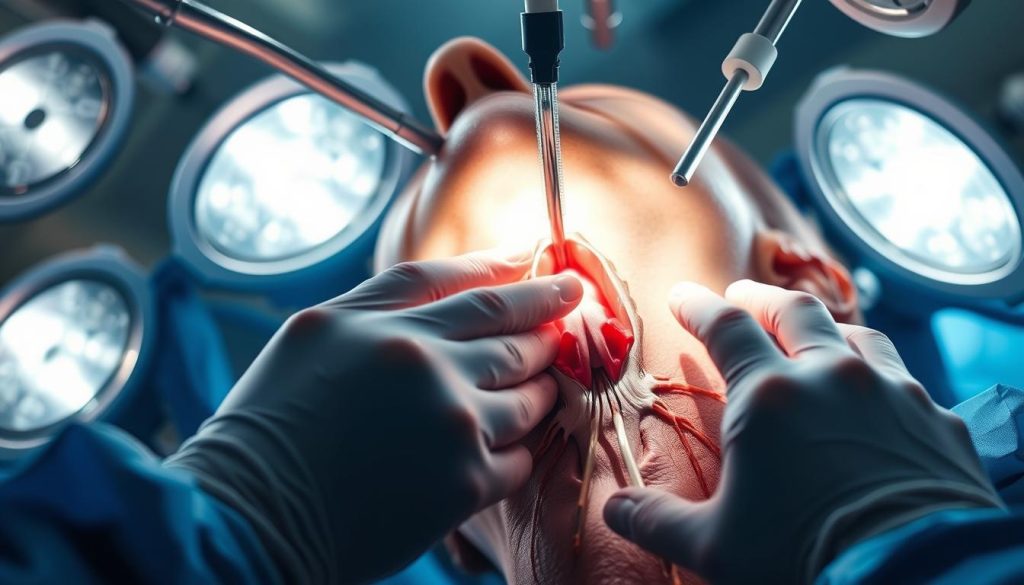Hyperparathyroidism affects millions of Americans. This condition happens when the parathyroid glands make too much hormone. Parathyroid surgery is a good treatment for many patients.
The parathyroid glands help control calcium levels in our bodies. If they don’t work right, surgery might be needed. This surgery aims to fix the hormone balance and ease symptoms.
Parathyroid surgery is a complex operation. It needs skill and care to find and remove the bad gland. New surgical methods have made this procedure safer and less scary for patients.
Understanding Hyperparathyroidism and Its Impact on Health
Hyperparathyroidism is a condition that affects how the body regulates calcium. The parathyroid glands in the neck make parathyroid hormone. This hormone is key for keeping calcium levels right in the blood and bones.
Primary vs Secondary Hyperparathyroidism
Primary hyperparathyroidism happens when parathyroid glands work too much. Secondary hyperparathyroidism is a response to low calcium levels from other health problems.
| Type | Cause | Treatment |
|---|---|---|
| Primary | Overactive parathyroid glands | Surgery |
| Secondary | Response to low calcium levels | Treating underlying condition |
Signs and Symptoms of Parathyroid Disease
Parathyroid disease shows in different ways. Common symptoms include:
- Fatigue
- Bone pain
- Kidney stones
- Cognitive issues
- Depression
Effects on Calcium Regulation in the Body
Hyperparathyroidism messes with calcium balance. High parathyroid hormone levels cause more calcium to be taken from bones and intestines. This can lead to high blood calcium levels and serious problems.
Keeping parathyroid hormone levels in check is vital for calcium balance. Regular checks and timely treatment can stop long-term health problems from hyperparathyroidism.
When Is Parathyroid Surgery Necessary?
Parathyroid surgery, or parathyroidectomy, is needed when hyperparathyroidism causes big health problems. Doctors look at many factors to see if surgery is the best treatment.

- Kidney stones
- Osteoporosis
- Persistent bone pain
- Cognitive difficulties
Doctors suggest surgery when blood calcium levels stay high, even with medicine. This shows the parathyroid glands are working too much and need surgery.
Age is also important in deciding on surgery. Young people with hyperparathyroidism often get surgery early. This helps avoid serious problems later on.
“Parathyroid surgery is often the most effective treatment for primary hyperparathyroidism, giving a lasting fix for many patients.”
Sometimes, surgery is urgent. This is true when hyperparathyroidism causes severe kidney problems or very high calcium levels. These can harm the heart’s rhythm.
The choice to have parathyroidectomy is made together by the patient and their endocrine specialist. They think about how bad the symptoms are, the patient’s overall health, and the risks. This helps decide if surgery is the right move.
Types of Parathyroid Surgery Procedures
Parathyroid surgery has changed a lot over time. Today, doctors have many ways to treat hyperparathyroidism. Let’s look at the main types of surgeries.
Minimally Invasive Parathyroidectomy
This modern surgery uses small cuts and new imaging tools. Surgeons can often remove the bad gland through a single, one-inch cut. This method cuts down on scarring and makes recovery faster.

Traditional Four-Gland Exploration
Sometimes, a bigger surgery is needed. This one checks all four parathyroid glands. It’s used when many glands are affected or when the smaller surgery isn’t right.
Focused Parathyroid Surgery
This surgery combines the best of both worlds. Surgeons use precise imaging to find the bad gland before they start. This lets them make a smaller cut while making sure all bad tissue is removed.
| Procedure | Incision Size | Recovery Time | Best For |
|---|---|---|---|
| Minimally Invasive | 1 inch | 1-2 days | Single gland issues |
| Four-Gland Exploration | 4-6 inches | 3-5 days | Multiple gland issues |
| Focused Surgery | 2-3 inches | 2-3 days | Localized problems |
Each surgery has its own good points. Your doctor will pick the best one for you based on your situation.
Preparing for Parathyroid Surgery: Essential Steps
Preparing for parathyroid surgery involves several key steps. These steps help make the surgery smooth and your recovery better. Here’s what you need to know before your surgery.
Required Medical Tests and Evaluations
Your doctor will order tests to check your health. These tests include blood work to check calcium and hormone levels. Imaging studies like ultrasound or sestamibi scans help find the affected glands.
These tests help surgeons plan the best surgery for you.
Dietary and Medication Guidelines
Follow your surgeon’s diet and medication advice closely. You might need to fast before the surgery. Some medications might need to be adjusted or stopped.
Tell your doctor about all your medications, including over-the-counter ones and supplements.

What to Expect Before Surgery
On surgery day, arrive at the hospital as told. The surgical team will review your medical history and do final checks. You’ll change into a hospital gown and get an IV line.
This preparation ensures a safe and successful surgery.
- Arrange transportation home post-surgery
- Bring a list of current medications
- Remove jewelry and contact lenses
- Wear comfortable, loose-fitting clothing
By following these guidelines, you’ll be ready for your parathyroid surgery. Your medical team is there to support you. Don’t hesitate to ask questions or share concerns as you prepare for this important step in your health journey.
Advanced Imaging Techniques for Parathyroid Localization
Removing parathyroid adenomas needs precise location. Modern imaging has made surgeries better and less invasive. Let’s look at the latest methods for finding parathyroid glands and adenomas before surgery.

Sestamibi scans are a key tool in parathyroid imaging. This nuclear medicine test uses a radioactive tracer to show active parathyroid glands. The tracer makes these glands visible on cameras. It’s great for finding single adenomas.
Ultrasound is a non-invasive, radiation-free way to plan parathyroid adenoma removal. It uses sound waves to create detailed neck images. Skilled technicians can spot gland abnormalities with this method.
CT scans give cross-sectional views of the neck and chest. These images help surgeons plan minimally invasive procedures. For complex cases, 4D CT scans offer even more precise images by showing changes over time.
MRI scans use magnets and radio waves to create detailed soft tissue images. They’re great for finding ectopic parathyroid glands – those in unusual places. MRI is essential when other methods can’t find the gland.
Using these advanced imaging techniques, endocrine surgeons can plan surgeries with great accuracy. This leads to shorter operations, smaller incisions, and better patient results.
The Role of Endocrine Surgeons in Treatment
Endocrine surgery is key in treating hyperparathyroidism. Skilled surgeons with specialized training are vital for success. They understand the complex endocrine system well.
Specialized Training and Expertise
Endocrine surgeons get thorough training in parathyroid procedures. They learn advanced techniques and stay current with new developments. This skill helps them handle complex cases and get the best results for patients.
Surgical Team Composition
A successful parathyroid surgery needs a well-coordinated team. Each team member brings their unique skills to ensure safety and positive outcomes.
| Team Member | Role |
|---|---|
| Endocrine Surgeon | Leads the surgery and makes critical decisions |
| Anesthesiologist | Manages pain control and monitors vital signs |
| Surgical Nurse | Assists the surgeon and manages equipment |
| Endocrinologist | Provides pre and post-operative hormone management |
Choosing an experienced endocrine surgery team is important. Patients get the best care from these specialists working together.
Minimally Invasive Techniques and Modern Approaches
Parathyroid surgery has changed a lot with new, less invasive methods. These new ways help patients more than old neck surgery methods.
These surgeries use smaller cuts, often under an inch. This means less scarring and quicker healing for patients. Doctors use high-tech imaging to find and remove the right glands.
Endoscopic parathyroidectomy is a common method. It uses small cameras and tools through tiny openings. This gives doctors a clear view, making the surgery more precise and less damaging.
| Surgical Approach | Incision Size | Recovery Time | Scarring |
|---|---|---|---|
| Traditional Open Surgery | 3-5 inches | 2-4 weeks | Noticeable |
| Minimally Invasive Surgery | 1 inch or less | 1-2 weeks | Minimal |
Robotic-assisted parathyroidectomy is another new method. It mixes the benefits of small cuts with robotic precision. This lets surgeons do detailed work with better control and a 3D view.
These new surgical methods do more than just help patients. They also cut down on hospital time and costs. As technology gets better, we’ll see even more new ways to do parathyroid surgery.
Recovery and Post-Operative Care Guidelines
After parathyroid surgery, it’s key to follow the right steps for healing. Patients need to stick to certain guidelines to recover well and avoid problems.
Hospital Stay Duration
Most people who have parathyroid surgery stay in the hospital for just a short time. Usually, they go home the same day. But sometimes, they might need to stay overnight for extra care.
Pain Management Strategies
Pain after parathyroid surgery is usually not too bad. Doctors often give out pain meds like acetaminophen or ibuprofen. If needed, stronger meds might be given. Putting ice packs on the neck can also help with swelling and pain.
Activity Restrictions
While recovering, it’s best to not do too much. Here are some tips:
- Avoid hard exercise for 1-2 weeks
- Don’t lift heavy things (over 10 pounds) for at least a week
- Rest and sleep with your head a bit higher
- Slowly start doing more as your doctor says
It’s important to follow care instructions from your surgeon. This includes taking good care of your wound, watching for infection signs, and going to follow-up visits. Most people can go back to work in a week, depending on their job and how they’re feeling.
Monitoring Parathyroid Hormone Levels After Surgery
After parathyroid surgery, it’s key to watch parathyroid hormone levels closely. This is to make sure the surgery was a success. Patients will see their hormone levels change quickly after the surgery.
Right after the surgery, hormone levels usually drop a lot. This drop is a sign that the surgery went well. Then, patients have blood tests regularly to check their hormone levels.
Doctors schedule follow-up visits at certain times:
- 24 hours post-surgery
- 1 week after the procedure
- 1 month following surgery
- 3 months post-operation
- 6 months after surgery
- Annually thereafter
At these visits, doctors check both parathyroid hormone and calcium levels. This helps keep calcium levels balanced in the body for a long time.
| Time After Surgery | Expected PTH Levels | Action Required |
|---|---|---|
| Immediately | Sharp decline | Monitor closely |
| 24 hours | Within normal range | Confirm surgical success |
| 1 week | Stable normal range | Adjust calcium supplements |
| 1-6 months | Consistent normal levels | Fine-tune medication if needed |
| Annually | Maintained normal range | Routine check for recurrence |
Keeping an eye on parathyroid hormone levels is key to catch any signs of hyperparathyroidism coming back. This careful watch helps doctors act fast if there’s a problem. It makes sure the surgery’s benefits last over time.
Potential Risks and Complications
Parathyroid surgery, like any neck surgery, carries certain risks. Understanding these risks helps patients make informed decisions about their treatment.
Common Side Effects
After thyroid surgery, patients may experience temporary hoarseness, difficulty swallowing, or neck discomfort. These symptoms usually resolve within a few weeks. Some individuals might notice a small scar at the incision site.
Long-term Considerations
In rare cases, parathyroid surgery can lead to long-lasting issues. These include persistent hypocalcemia, requiring ongoing calcium supplements. Voice changes, though uncommon, can occur if the laryngeal nerves are affected during the procedure.
| Complication | Frequency | Management |
|---|---|---|
| Hypocalcemia | 5-10% | Calcium supplements |
| Voice changes | 1-2% | Speech therapy |
| Bleeding | 1% | Surgical intervention |
Emergency Warning Signs
Patients should seek immediate medical attention if they experience severe neck swelling, difficulty breathing, or intense pain following neck surgery. These symptoms could indicate serious complications requiring urgent care.
While complications from parathyroid surgery are rare, staying informed about risks ensures prompt recognition and treatment if issues arise.
Success Rates and Long-term Outcomes
Parathyroid surgery is a top choice for treating hyperparathyroidism. It has a success rate of 95% to 98% with skilled endocrine surgeons. This means big health wins and a better life for patients.
After surgery, most patients feel better fast. Their bones get stronger, and kidney stone risks drop a lot. These changes happen quickly, often in days or weeks.
What makes surgery successful? A few key things:
- Surgeon experience and expertise
- Accurate preoperative localization
- Type of surgical procedure performed
- Patient’s overall health condition
Let’s look at some long-term benefits:
| Outcome Measure | 1 Year Post-Surgery | 5 Years Post-Surgery |
|---|---|---|
| Bone Density Improvement | 3-5% | 10-12% |
| Kidney Stone Risk Reduction | 50% | 90% |
| Quality of Life Score Increase | 20-30% | 30-40% |
These numbers show why early treatment is key. Patients often feel more energetic, happier, and overall better years after surgery.
Follow-up Care and Ongoing Monitoring
After parathyroid surgery, it’s key to follow up properly for the best recovery and health. Patients must watch their calcium levels and overall health closely.
Regular Check-up Schedule
Post-surgery check-ups are important to track healing and calcium levels. Here’s a typical schedule:
- 1 week post-surgery: Initial follow-up
- 1 month post-surgery: Blood work and physical exam
- 3 months post-surgery: Detailed evaluation
- 6 months and 1 year post-surgery: Long-term checks
Calcium Level Management
Keeping calcium levels right after parathyroid surgery is critical. Patients might need to change their diet or take supplements to manage calcium.
| Calcium Source | Daily Recommendation | Benefits |
|---|---|---|
| Dairy products | 3 servings | High calcium content, easily absorbed |
| Leafy greens | 2-3 cups | Rich in calcium, provides other nutrients |
| Calcium supplements | As prescribed | Helps meet daily requirements if diet is insufficient |
Regular blood tests are key to tracking calcium levels. This lets doctors adjust treatment plans if needed. If you notice muscle cramps or tingling, tell your doctor right away. These signs might mean your calcium levels are off.
Following up on care and keeping calcium levels in check are essential. This way, patients can get the best results after parathyroid surgery.
Alternative Treatments and Their Effectiveness
While surgery is the main treatment for hyperparathyroidism, other options exist. Medical management can help control calcium levels in some cases. These alternatives might be good for those who can’t have surgery or have mild symptoms.
Medications are key in non-surgical treatments. Calcimimetics, like cinacalcet, can lower parathyroid hormone levels. Bisphosphonates strengthen bones and reduce calcium release. Hormone replacement therapy may help postmenopausal women with the condition.
New therapies are being explored for hyperparathyroidism treatment. These include new calcimimetics and parathyroid hormone analogs. Research is ongoing to see how well they work and if they are safe in the long run.
| Treatment Option | Effectiveness | Best For |
|---|---|---|
| Surgery | High (95% cure rate) | Most patients |
| Calcimimetics | Moderate | Inoperable cases |
| Bisphosphonates | Low to Moderate | Bone density issues |
| Hormone Therapy | Low | Postmenopausal women |
Lifestyle changes can also help with hyperparathyroidism treatment. Drinking more water, drinking less alcohol, and exercising regularly are good. Eating a diet rich in vitamin D can also help manage symptoms in milder cases.
Cost and Insurance Considerations for Surgery
Understanding the cost of parathyroidectomy is key for patients. The price can range from $8,000 to $25,000 or more. This includes fees for the surgeon, hospital charges, and care after surgery. Many things can affect the final cost, like the surgery method and the hospital’s location.
Insurance coverage for parathyroidectomy varies. Most plans cover it if it’s medically needed. Patients should check with their insurance to know what’s covered and what they might have to pay. It’s also good to ask about deductibles, copayments, and any pre-authorization needed.
If you don’t have insurance, some hospitals offer payment plans or discounts. Medical tourism is another choice, with some going to other countries for cheaper surgery. It’s important to think about the costs and the benefits of treating hyperparathyroidism.
FAQ
Q: What is hyperparathyroidism?
A: Hyperparathyroidism happens when the parathyroid glands make too much hormone. This hormone controls calcium in the body. If not treated, it can cause health problems.
Q: How is parathyroid surgery performed?
A: Parathyroid surgery, or parathyroidectomy, uses different methods. These include minimally invasive surgery and traditional four-gland exploration. The choice depends on the patient’s needs and the surgeon’s skills.
Q: Who should consider parathyroid surgery?
A: Surgery is often suggested for those with severe symptoms or complications. This includes osteoporosis or kidney stones. An endocrine surgeon will decide if surgery is right for you.
Q: What are the benefits of minimally invasive parathyroid surgery?
A: This surgery has many advantages. It uses smaller cuts, leads to quicker healing, and causes less pain. It also looks better than traditional neck surgery.
Q: How long does recovery from parathyroid surgery take?
A: Recovery times vary. Most patients go home the same day or after a short stay. It usually takes 1-2 weeks to fully recover, with most back to normal in a few days.
Q: What are the risks associated with parathyroid surgery?
A: Risks include bleeding, infection, and changes in voice. Damage to nearby areas is also possible. But, with an experienced surgeon, these risks are low.
Q: How successful is parathyroid surgery in treating hyperparathyroidism?
A: Surgery is very effective, with success rates over 95%. Success is shown by normal hormone levels and symptom relief.
Q: Will I need to take calcium supplements after surgery?
A: Some may need calcium supplements after surgery. Your surgeon will tell you if you need them based on your hormone and calcium levels.
Q: How are parathyroid glands located before surgery?
A: Imaging like sestamibi scans and ultrasound find the glands before surgery. This helps in precise removal and choosing the best surgery method.
Q: Are there alternatives to parathyroid surgery for treating hyperparathyroidism?
A: Surgery is often the best treatment, but some cases may be managed with medication. These alternatives are for those not good for surgery or with mild cases.


















